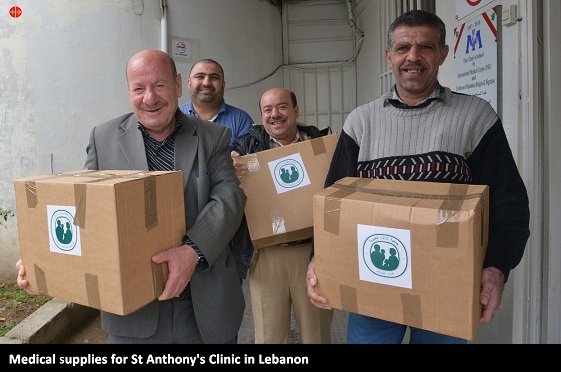“Religion is for God and the dispensary is for everyone” – Catholic-run clinic helps refugees in Beirut
“Religion is for God and the dispensary is for everyone” – that is the motto displayed at the entrance to St. Anthony’s medical dispensary in Beirut , run by the Good Shepherd Sisters. Dr. Hadi Jaklh, a physician who supervises a rotating team of 40 doctors at the clinic, said “we don’t get into religion or politics” with the patients, adding “we provide them with the best service we can possibly give”.
The spotlessly clean clinic is constructed from four metal shipping containers joined together. The walls are adorned with illustrated posters in Arabic giving nutritional guidelines; instructions for breast self-examinations; and ways to prevent and treat outbreaks of lice. The health centre is supported by international agencies including Aid to the Church in Need and the Catholic Near East Welfare Association .
St Anthony’s clinic, which is accredited by Lebanon’s ministry of health, functions as a primary health care center serving Iraqi and Syrian refugees, as well as Lebanon’s poor. Last year the dispensary helped 17,000 people, with an average of 200 refugees being treated each day. During a recent vaccination campaign over 2,000 children were vaccinated at the clinic in less than a week.
At the clinic, patients pay only 75 cents for a month’s supply of medication for a chronic condition like hypertension. Treatment by a general physician, pediatrician or gynecologist costs under 4 euros. The fee for a specialist such as a cardiologist is $8.
When Islamic State seized control of Qaraqosh in August 2014, around 50,000 Christians were driven from their homes. A large number settled in Lebanon, hoping to emigrate to Europe or America eventually. Many of the Iraqis refugees were well off in their homeland but came to Lebanon with nothing. Unable to find work, they were soon reduced to desperate poverty when their meagre funds ran out.
“I really don’t have words to describe how they are living,” said Good Shepherd Sister Georgette Tannoury. “They are very traumatized. I cannot even repeat what they tell me.”
“It’s a bit difficult to see this big load of patients who had everything in their country and suddenly they had to leave everything and come here,” said Dr Jalkh, adding that some were now so poor “ they cannot even afford a blood test”.
“It’s very painful for them and for the staff working here. We are dealing everyday with people not only with medical issues, but psychological issues and psychological difficulties,” Dr Jalkh said.
Lebanon, which has a population of around 4 million, is housing 3 million refugees, of which more than 1.5 million are Syrian. Dr Jalkh said he hoped “that the crisis will soon end so that they can either go back to their country or have the opportunity to go elsewhere and live in dignity,”
In the Good Shepherd Sisters’ ministry of mercy , the Sisters see the face of God in each person they encounter. “For me as a religious, I try to live the mercy of God, I try be compassionate with them, to help them” said Sister . She sadly admitted that what she could do was “ very, very limited …. it is nothing compared to how they are living as people. They are living an injustice.”
ACN Malta






